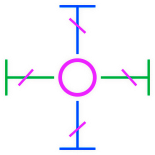 dublang user manual
dublang user manualhome - plugins - tutorials - showcase - history - manual - design
 dublang user manual
dublang user manualthis reference manual describes the dublang features, ideas and concepts
shebang are lines starting by the two characters #! followed by the dublang plugin name
shebang defines regions in dublang language and can be added at any place, multiple times
for instance, the line #!supercollider defines a region
to write SuperCollider code
#!supercollider
{ SinOsc.ar([220, 140]) }.play
#!tidalcycles
d1 $ sound "808bd(3,8)"
# shape 0.2services handles live coding servers and tools, it is built on top of systemd, the dublang command-line interface (cli) can be used to install (enable), remove (disable), start and stop services
handlers are executable files, usually lua scripts, that wraps an external tool, run it, and open a TCP server waiting for connection from dublang-nvim
handlers execution are managed by systemd
custom services and handlers can be added to the PROJECT-level
folders services/ and handlers/
the dublang command-line interface (cli) is able to enable and start custom handlers by-project level
filters are Lua functions executed each time a code block is
evaluated by "CTRL + e"
for example if the SuperCollider code below is evaluated
~dirt.loadSoundFiles("${HOME}/samples/*")then the envsubst filter will replace
"${HOME}" for "/home/joenio" (in my case),
before the code is sent to SuperCollider
filters are executed before the block itself and multiple functions
can be combined in a pipeline of filters, each plugin defines a
different pipeline but the envsubst is enabled by default
in all plugins
envsubstthe filter envsubst expands environment variables in the
format ${NAME} before execution, it works like the unix
command-line tool envsubst
example
#!dublang
return ${HOME}this example will return “/home/joenio” for my user
the envsubst filter is enabled by default for all
plugins
example using it to load samples with SuperDirt for Tidal Cycles
#!supercollider
~dirt.loadSoundFiles("${HOME}/samples/*")confsubstthe filter confsubst expands strings
${config.NAME1.NAME2} by Lua variables defined in the
namespace config.NAME1.NAME2 before execution, it works
like the filter envsubst but using values defined by Lua
instead of using environment variables
example
#!dublang
return ${config.path.sounds}this example will return the value for Lua global variable
config.path.sounds
the confsubst filter is enabled by default for all
plugins
example using it to set pth for MPV videos and images
#!dublang
config.path.mpv = "/home/joenio/videos"
#!mpv
video "dune:01.mp4"triggers are methods to modify code block evaluation defined on
shebang level, added below the shebang line in the format
"|trigger [args]"
|repeat [n]the trigger repeat schedule the last block execution to
be re-executed in a infinite loop every [n] seconds
example
#!dublang
|repeat 5
return 'hello world'after the code above be executed it be re-executed every 5 seconds
hooks are points of communication among plugins where events generated by one plugin can be captured by others plugins
one plugin can implement the function hook() to attract
others plugins, any plugin implementing the function bite()
will bite on the hook executing the function hook() for
every connected plugin when code is evaluated by
"CTRL + e", for example
foo and bar are enabledfoo.hook() and bar.bite()
are definedbar is executed by pressing
"CTRL + e"bar.bite() runs the function
foo.hook()see below a diagram with the general overview of hooks and bites functions
plugins can customize the bite() function, but the
default code looks like the code below (in Lua)
for i, p in pairs(plugins) do
if p.hook and p.connected then
local ok, err = pcall(p.hook, p, ...)
end
endplugins using hooks
.dub each
time a block is evaluated by others pluginsreference manual for plugins
home - plugins - tutorials - showcase - history - manual - design